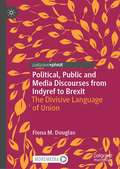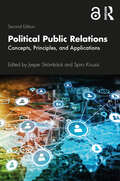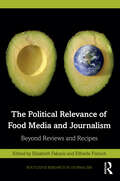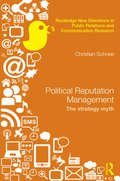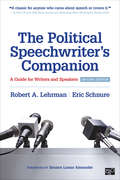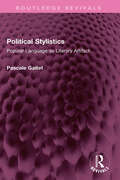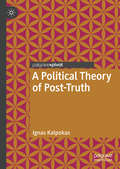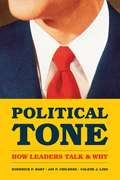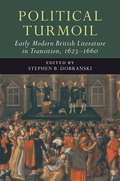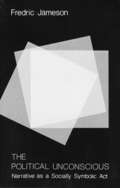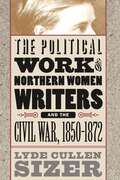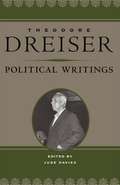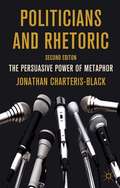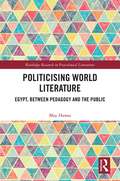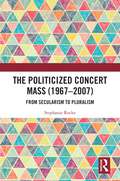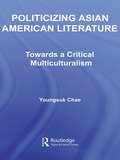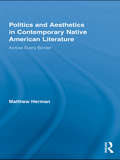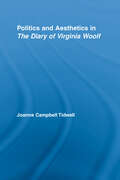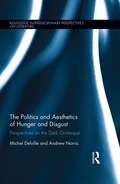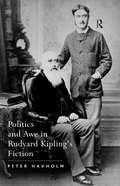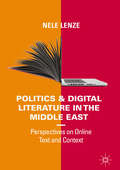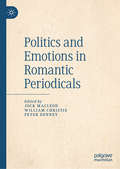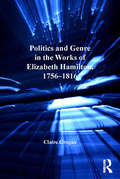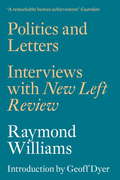- Table View
- List View
Political, Public and Media Discourses from Indyref to Brexit: The Divisive Language of Union (Rhetoric, Politics and Society)
by Fiona M. DouglasThis book focuses on the language of two unions (the United Kingdom and the European Union), tracing the emergence of divisive discourses from indyref to Brexit. It explains the background to the creation of these unions and summarizes recent political events that have brought their future into question. It considers which identities (national, supranational, social, ethnic or racial) were invoked during the indyref and EU referendum campaigns, emphasising the crucial role played by language in maintaining these identities, in conceptualizing the nation, to do politics, and its power to unite or divide. Based on analysis of three specialist corpora totaling over 143 million words and comprising multiple text types (newspapers, speeches, Twitter posts, parliamentary debates, party political websites and campaign materials), it interrogates the language used by politicians, the media and the public, uncovering increasingly problematic, scaremongering, xenophobic and incendiary linguistic strategies used to divide us from them.
Political Public Relations: Concepts, Principles, and Applications (Routledge Communication Series)
by Jesper Stromback Spiro KiousisThe second edition of Political Public Relations offers an interdisciplinary overview of the latest theory and research in the still emerging field of political public relations. The book continues its international orientation in order to fully contextualize the field amidst the various political and communication systems today. Existing chapters have been updated and new chapters added to reflect evolving trends such as the rise of digital and social media, increasing political polarization, and the growth of political populism. As a singular contribution to scholarship in public relations and political communication, this volume serves as an important catalyst for future theory and research. This volume is ideal for researchers and courses at the intersection of public relations, political communication, and political science.
The Political Relevance of Food Media and Journalism: Beyond Reviews and Recipes (Routledge Research in Journalism)
by Elizabeth Fakazis Elfriede FürsichInterrogating the intersections of food, journalism, and politics, this book offers a critical examination of food media and journalism, and its political potential against the backdrop of contemporary social challenges. Contributors analyze current and historic examples such as #BlackLivesMatter, COVID-19, climate change, Brexit, food sovereignty, and identity politics, highlighting how food media and journalism reach beyond the commercial imperatives of lifestyle journalism to negotiate nationalism, globalization, and social inequalities. The volume challenges the idea that food media/journalism are trivial and apolitical by drawing attention to the complex ways that storytelling about food has engaged political discourses in the past, and the innovative ways it is doing so today. Bringing together international scholars from a variety of disciplines, the book will be of great interest to scholars and students of journalism, communication, media studies, food studies, sociology, and anthropology.
Political Reputation Management: The Strategy Myth (Routledge New Directions in PR & Communication Research)
by Christian SchneeIt is widely assumed that a competitive political environment of public distrust and critical media forces political parties to manage communications and reputations strategically, but is this really true? Comprehensive control of communications in a fast-moving political and media setting isoften upset by events outside the communicator’s control, taking over the news agenda andchanging the political narrative. Based on interviews with leading communicators and journalists, this book explores the tensions between a planned, strategic communications approach and a reactive, tactical one. The interviewees, who over the past 15 years have been instrumental in presenting and shaping the public persona of party leaders and Prime Ministers, include, amongst others, William Hague, Ian Duncan-Smith, Michael Howard, David Cameron, Tony Blair and Gordon Brown.It draws a unique picture of how political reputations are managed and, ultimately, confirms the discrepancy between what political communications management is thought to be, and how communications practitioners actually operate. This book empirically reviews political communications practice in order to analyse to what degree reality matches the concepts of strategic communications management. This will be essential reading for researchers, educators and advanced students in public relations, communications studies and marketing.
The Political Speechwriter's Companion: A Guide for Writers and Speakers
by Robert A. Lehrman Eric L. SchnureThe Political Speechwriter's Companion: A Guide for Writers and Speakers guides students through a systematic “LAWS” approach (language, anecdote, wit, and support) that politicians can use to persuade their audiences into taking action. In the highly anticipated Second Edition, esteemed speechwriter and author Robert A. Lehrman has teamed up with one of the "go-to-guys" for political humor, Eric Schnure, to offer students an entertaining yet practical introduction to political speechwriting. This how-to guide explains how speakers can deliver: language the audience will understand and remember; anecdotes that make listeners laugh and cry; wit that pokes fun at opponents but also shows their own lighter side; and support in the way of statistics, examples, and testimony. Packed with annotated speeches from the most recent elections, technology tips, and interviews from speechwriting luminaries, this edition offers the most practical advice and strategies for a career in political communication.
The Political Speechwriter's Companion: A Guide for Writers and Speakers
by Robert A. Lehrman Eric L. SchnureThe Political Speechwriter's Companion: A Guide for Writers and Speakers guides students through a systematic “LAWS” approach (language, anecdote, wit, and support) that politicians can use to persuade their audiences into taking action. In the highly anticipated Second Edition, esteemed speechwriter and author Robert A. Lehrman has teamed up with one of the "go-to-guys" for political humor, Eric Schnure, to offer students an entertaining yet practical introduction to political speechwriting. This how-to guide explains how speakers can deliver: language the audience will understand and remember; anecdotes that make listeners laugh and cry; wit that pokes fun at opponents but also shows their own lighter side; and support in the way of statistics, examples, and testimony. Packed with annotated speeches from the most recent elections, technology tips, and interviews from speechwriting luminaries, this edition offers the most practical advice and strategies for a career in political communication.
Political Stylistics: Popular Language as Literary Artifact (Routledge Revivals)
by Pascale GaitetFirst published in 1992, Political Stylistics draws together ideas about society and language from a range of theorists including Pratt, Bourdieu, Goody and Watt, and Bakhtin, to establish a political stylistics: a way of studying the formal properties of texts based on the principle that all linguistic production operates within the intricate network of power relations that structure the social realm. On a practical level, this methodology is used to analyse the representation of popular French and argot in three literary works where it extends beyond the speech of the characters and enters the narrative. The book is articulated along three axes: the trajectory of the French working class from mid-nineteenth century to the mid-twentieth century; the trajectory of popular language from social margin to literary centre; and the evolution of the novel from naturalism to modernism, to post-modernism. This book will be of interest to students of literature, linguistics, literary theory, and cultural studies.
A Political Theory of Post-Truth
by Ignas KalpokasThis book combines political theory with media and communications studies in order to formulate a theory of post-truth, concentrating on the latter’s preconditions, context, and functions in today’s societies. Contrary to the prevalent view of post-truth as primarily manipulative, it is argued that post-truth is, instead, a collusion in which audiences willingly engage with aspirational narratives co-created with the communicators. Meanwhile, the broader meta-framework for post-truth is provided by mediatisation—increasing subjection of a variety of social spheres to media logic and the primacy of media in everyday human activities. Ultimately, post-truth is governed by collective efforts to maximise the pleasure of encountering the world and attempts to set hegemonic benchmarks for such pleasure.
Political Tone: How Leaders Talk and Why
by Roderick P. Hart Jay P. Childers Colene J. LindIt's not what you say, but how you say it. Solving problems with words is the essence of politics, and finding the right words for the moment can make or break a politician's career. Yet very little has been said in political science about the elusive element of tone. In Political Tone, Roderick P. Hart, Jay P. Childers, and Colene J. Lind analyze a range of texts--from speeches and debates to advertising and print and broadcast campaign coverage-- using a sophisticated computer program, DICTION, that parses their content for semantic features like realism, commonality, and certainty, as well as references to religion, party, or patriotic terms. Beginning with a look at how societal forces like diversity and modernity manifest themselves as political tones in the contexts of particular leaders and events, the authors proceed to consider how individual leaders have used tone to convey their messages: How did Bill Clinton's clever dexterity help him recover from the Monica Lewinsky scandal? How did Barack Obama draw on his experience as a talented community activist to overcome his inexperience as a national leader? And how does Sarah Palin's wandering tone indicate that she trusts her listeners and is open to their ideas? By focusing not on the substance of political arguments but on how they were phrased, Political Tone provides powerful and unexpected insights into American politics.
Political Turmoil: Volume 2 (Early Modern Literature in Transition)
by Stephen B. DobranskiThe early modern period in Britain was defined by tremendous upheaval - the upending of monarchy, the unsettling of church doctrine, and the pursuit of a new method of inquiry based on an inductive experimental model. Political Turmoil: Early Modern Literature in Transition, 1623–1660 offers an innovative and ambitious re-appraisal of seventeenth-century British literature and history. Each of the contributors attempts to address the 'how' and 'why' of aesthetic change by focusing on political and cultural transformations. Instead of forging a grand narrative of continuity, the contributors attempt to piece together the often complex web of factors and events that contributed to developments in literary form and matter - as well as the social and religious changes that literature sometimes helped to occasion. These twenty chapters, reading across traditional periodization, demonstrate that early modern literary works - when they were conceived, as they were created, and after they circulated - were, above all, involved in various types of transitions.
The Political Unconscious: Narrative as a Socially Symbolic Act
by Fredric JamesonFredric Jameson, in The Political Unconscious, opposes the view that literary creation can take place in isolation from its political context. He asserts the priority of the political interpretation of literary texts, claiming it to be at the center of all reading and understanding, not just a supplement or auxiliary to other methods current today. Jameson supports his thesis by looking closely at the nature of interpretation. Our understanding, he says, is colored by the concepts and categories that we inherit from our culture's interpretive tradition and that we use to comprehend what we read. How then can the literature of other ages be understood by readers from a present that is culturally so different from the past? Marxism lies at the foundation of Jameson's answer, because it conceives of history as a single collective narrative that links past and present; Marxist literary criticism reveals the unity of that uninterrupted narrative. Jameson applies his interpretive theory to nineteenth- and twentieth-century texts, including the works of Balzac, Gissing, and Conrad. Throughout, he considers other interpretive approaches to the works he discusses, assessing the importance and limitations of methods as different as Lacanian psychoanalysis, semiotics, dialectical analysis, and allegorical readings. The book as a whole raises directly issues that have been only implicit in Jameson's earlier work, namely the relationship between dialectics and structuralism, and the tension between the German and the French aesthetic traditions. The Political Unconscious is a masterly introduction to both the method and the practice of Marxist criticism. Defining a mode of criticism and applying it successfully to individual works, it bridges the gap between theoretical speculation and textual analysis.
The Political Work of Northern Women Writers and the Civil War, 1850-1872 (Civil War America)
by Lyde Cullen SizerThis volume explores the lives and works of nine Northern women who wrote during the Civil War period, examining the ways in which, through their writing, they engaged in the national debates of the time. Lyde Sizer shows that from the 1850 publication of Uncle Tom's Cabin through Reconstruction, these women, as well as a larger mosaic of lesser-known writers, used their mainstream writings publicly to make sense of war, womanhood, Union, slavery, republicanism, heroism, and death. Among the authors discussed are Lydia Maria Child, Harriet Beecher Stowe, Sara Willis Parton (Fanny Fern), Frances Ellen Watkins Harper, Mrs. E. D. E. N. Southworth, Mary Abigail Dodge (Gail Hamilton), Louisa May Alcott, Rebecca Harding Davis, and Elizabeth Stuart Phelps. Although direct political or partisan power was denied to women, these writers actively participated in discussions of national issues through their sentimental novels, short stories, essays, poetry, and letters to the editor.Sizer pays close attention to how these mostly middle-class women attempted to create a "rhetoric of unity," giving common purpose to women despite differences in class, race, and politics. This theme of unity was ultimately deployed to establish a white middle-class standard of womanhood, meant to exclude as well as include.
Political Writings
by Theodore DreiserTheodore Dreiser staked his reputation on fearless expression in his fiction, but he never was more outspoken than when writing about American politics. Spanning a period in American history from the Progressive Era to the advent of the Cold War, this generous volume collects Dreiser's most important political writings from his journalism, broadsides, speeches, private papers, and long out-of-print nonfiction books. Touching on the Great Depression, the New Deal, and both World Wars as well as Soviet Russia and the persecution of Jews in Nazi Germany, these writings exemplify Dreiser's candor and his penchant for championing the defenseless and railing against corruption. The works also navigate historical terrain with prescient observations on topics such as religion, civil rights, national responsibility, individual ethics, global relations, and censorship that remain relevant to a contemporary audience.
Politicians and Rhetoric
by Jonathan Charteris-BlackThis analysis of the rhetoric of nine successfully persuasive politicians explains how their use of language created credible and consistent stories about themselves and the social world they inhabit. It explores their use of metaphors, their myths and how language analysis helps us to understand how politicians are able to persuade.
Politicising World Literature: Egypt, Between Pedagogy and the Public (Routledge Research in Postcolonial Literatures)
by May HawasPoliticising World Literature: Egypt, Between Pedagogy and the Public engages with postcolonial and world literature approaches to examine the worldly imaginary of the novel genre and assert the political imperative to teaching world literature. How does canonising world literature relate to societal, political or academic reform? Alternating between close reading of texts and literary history, this monograph studies a corpus of novels and travelogues in English, Arabic, French, Czech and Italian to historicise Egypt’s literary relations with different parts of the world in both the modern period and the pre-modern period. In this rigorous study, May Hawas argues that protagonists, particularly in times of political crises, locate themselves as individuals with communal or political affiliations that supersede, if not actually resist, national affiliations.
The Politicized Concert Mass (1967-2007): From Secularism to Pluralism
by Stephanie RockeSince the transformative 1960s, concert masses have incorporated a range of political and religious views that mirror their socio-cultural context. Those of the long 1960s (c1958-1975) reflect non-conformism and social activism; those of the 1980s, environmentalism; those of the 1990s, universalism; and those of the 2000s, cultural pluralism. Despite utilizing a format with its roots in the Roman Catholic liturgy, many of these politicized concert masses also reflect the increasing religious diversification of Western societies. By introducing non-Catholic and often non-Christian beliefs into masses that also remain respectful of Christian tradition, composers in the later twentieth century have employed the genre to promote a conciliatory way of being that promotes the value of heterogeneity and reinforces the need to protect the diversity of musics, species and spiritualities that enrich life. In combining the political with the religious, the case studies presented pose challenges for both supporters and detractors of the secularization paradigm. Overarchingly, they demonstrate that any binary division that separates life into either the religious or the secular and promotes one over the other denies the complexity of lived experience and constitutes a diminution of what it is to be human.
Politicizing Asian American Literature: Towards a Critical Multiculturalism (Studies in Asian Americans)
by Youngsuk ChaeThis book examines U.S. multiculturalism from the perspective of Asian American writings, drawing contrasts between politically acquiescent multiculturalism and politically conscious multiculturalism. Chae discusses the works of writers who have highlighted a critical awareness of Asian Americans’ social and economic status and their position as 'unassimilable aliens', 'yellow perils', 'coolies', 'modern-day high tech coolies', or as a 'model minority', which were ideologically woven through the complex interactions of capital and labor in the U.S. cultural and labor history. Chae suggests that more productive means of analysis must be brought to the understanding of Asian American writings, many of which have been attempting to raise awareness of the politicizing effects of U.S. multiculturalism.
Politics and Aesthetics in Contemporary Native American Literature: Across Every Border (Indigenous Peoples and Politics)
by Matthew HermanOver the last twenty years, Native American literary studies has taken a sharp political turn. In this book, Matthew Herman provides the historical framework for this shift and examines the key moments in the movement away from cultural analyses toward more politically inflected and motivated perspectives. He highlights such notable cases as the prevailing readings of the popular within Native American writing; the Silko-Erdrich controversy; the ongoing debate over the comparative value of nationalism versus cosmopolitanism within Native American literature and politics; and the status of native nationalism in relation to recent critiques of the nation coming from postmodernism, postcolonialism, and subaltern studies. Herman concludes that the central problematic defining the last two decades of Native American literary studies has involved the emergence in theory of anti-colonial nationalism, its variants, and its contradictions. This study will be a necessary addition for students and scholars of Native American Studies as well as 20th-century literature.
Politics and Aesthetics in The Diary of Virginia Woolf (Studies in Major Literary Authors)
by Joanne TidwellIn this critical study, Tidwell examines the conflict of aesthetics and politics in The Diary of Virginia Woolf. As a modernist writer concerned with contemporary aesthetic theories, Woolf experimented with limiting the representative nature of writing. At the same time, as a feminist, Woolf wanted to incorporate her political interests in her fiction, but overt political statement conflicted with her aesthetic ideals. Her solution was to combine innovative narrative techniques and subject matter traditionally associated with women. Tidwell analyzes several of Woolf’s novels, including To the Lighthouse, Jacob’s Room, and Between the Acts to elucidate the diary’s technique and form, as well as to cast it as a valuable contribution to Woolf’s canon.
The Politics and Aesthetics of Hunger and Disgust: Perspectives on the Dark Grotesque (Routledge Interdisciplinary Perspectives on Literature)
by Michel Delville Andrew NorrisThis study examines how hunger narratives and performances contribute to a reconsideration of neglected or prohibited domains of thinking which only a full confrontation with the body’s heterogeneity and plasticity can reveal. From literary motif or psychosomatic symptom to revolutionary gesture or existential malady, the double crux of hunger and disgust is a powerful force which can define the experience of embodiment. Kafka’s fable of the "Hunger Artist" offers a matrix for the fast, while its surprising last-page revelation introduces disgust as a correlative of abstinence, conscious or otherwise. Grounded in Kristeva’s theory of abjection, the figure of the fraught body lurking at the heart of the negative grotesque gathers precision throughout this study, where it is employed in a widening series of contexts: suicide through overeating, starvation as self-performance or political resistance, the teratological versus the totalitarian, the anorexic harboring of death. In the process, writers and artists as diverse as Herman Melville, Percy Bysshe Shelley, Christina Rossetti, George Orwell, Knut Hamsun, J.M. Coetzee, Cindy Sherman, Pieter Breughel, Marina Abramovic, David Nebreda, Paul McCarthy, and others are brought into the discussion. By looking at the different acts of visceral, affective, and ideological resistance performed by the starving body, this book intensifies the relationship between hunger and disgust studies while offering insight into the modalities of the "dark grotesque" which inform the aesthetics and politics of hunger. It will be of value to anyone interested in the culture, politics, and subjectivity of embodiment, and scholars working within the fields of disgust studies, food studies, literary studies, cultural theory, and media studies.
Politics and Awe in Rudyard Kipling's Fiction
by Peter HavholmThere has been a resurgence of interest in Kipling among critics who struggle to reconcile the multiple pleasures offered by his fiction with the controversial political ideas that inform it. Peter Havholm takes up the challenge, piecing together Kipling's understanding of empire and humanity from evidence in Anglo-Indian and Indian newspapers of the 1870s and 1880s and offering a new explanation for Kipling's post-1891 turn to fantasy and stories written to be enjoyed by children. By dovetailing detailed contextual knowledge of British India with informed and sensitive close readings of well-known works like 'The Man Who Would Be King',' Kim', 'The Light That Failed', and 'They', Havholm offers a fresh reading of Kipling's early and late stories that acknowledges Kipling's achievement as a writer and illuminates the seductive allure of the imperialist fantasy.
Politics and Digital Literature in the Middle East: Perspectives On Online Text And Context
by Nele LenzeDuring the 2000's, online literature in Arabic language was popular among a larger readership. Writings on subjects dealing with politics, globalization, and social matters gained are well-received. While mapping the genre, this monograph shows literary developments in print and digital during these peak years to provide a historical context for the material. Online literary culture is linked to social, economic, and political developments within the last two decades. This book presents the differences between online and print literature as it relates to writer-readership interaction, literary quality, language and style, critical reception, and circulation. The geographic location of the analysis focuses on Gulf countries featuring a comparative study of Egypt and Lebanon.
Politics and Emotions in Romantic Periodicals
by Jock Macleod William Christie Peter DenneyThis book comprises eleven essays by leading scholars of early nineteenth-century British literature and periodical culture. The collection addresses the many and varied links between politics and the emotions in Romantic periodicals, from the revolutionary decade of the 1790s, to the 1832 Reform Bill. In so doing, it deepens our understanding of the often conflicted relations between politics and feelings, and raises questions relevant to contemporary debates on affect studies and their relation to political criticism. The respective chapters explore both the politics of emotion and the emotional register of political discussion in radical, reformist and conservative periodicals. They are arranged chronologically, covering periodicals from Pigs’ Meat to Blackwood’s Edinburgh Magazine and the Spectator. Recurring themes include the contested place of emotion in radical political discourse; the role of the periodical in mediating action and performance; the changing affective frameworks of cultural politics (especially concerning gender and nation), and the shifting terrain of what constitutes appropriate emotion in public political discourse.
Politics and Genre in the Works of Elizabeth Hamilton, 1756–1816
by Claire GroganIn the first book-length study of the well-respected and popular British writer Elizabeth Hamilton, Claire Grogan addresses a significant gap in scholarship that enlarges and complicates critical understanding of the Romantic woman writer. From 1797 to 1818, Hamilton published in a wide range of genres, including novels, satires, historical and educational treatises, and historical biography. Because she wrote from a politically centrist position during a revolutionary age, Grogan suggests, Hamilton has been neglected in favor of authors who fit within the Jacobin/anti-Jacobin framework used to situate women writers of the period. Grogan draws attention to the inadequacies of the Jacobin/anti-Jacobin binary for understanding writers like Hamilton, arguing that Hamilton and other women writers engaged with and debated the issues of the day in more veiled ways. For example, while Hamilton did not argue for sexual emancipation à la Mary Wollstonecraft and Mary Hays, she asserted her rights in other ways. Hamilton's most radical advance, Grogan shows, was in her deployment of genre, whether she was mixing genres, creating new generic medleys, or assuming competence in a hitherto male-dominated genre. With Hamilton serving as her case study, Grogan persuasively argues for new strategies to uncover the means by which women writers participated in the revolutionary debate.
Politics and Letters
by Raymond Williams Geoff DyerRaymond Williams made a central contribution to the intellectual culture of the Left in the English-speaking world. He was also one of the key figures in the foundation of cultural studies in Britain, which turned critical skills honed on textual analysis to the examination of structures and forms of resistance apparent in everyday life. Politics and Letters is a volume of interviews with Williams, conducted by New Left Review, designed to bring into clear focus the major theoretical and political issues posed by his work. Introduced by writer Geoff Dyer, Politics and Letters ranges across Williams's biographical development, the evolution of his cultural theory and literary criticism, his work on dramatic forms and his fiction, and an exploration of British and international politics.From the Trade Paperback edition.
